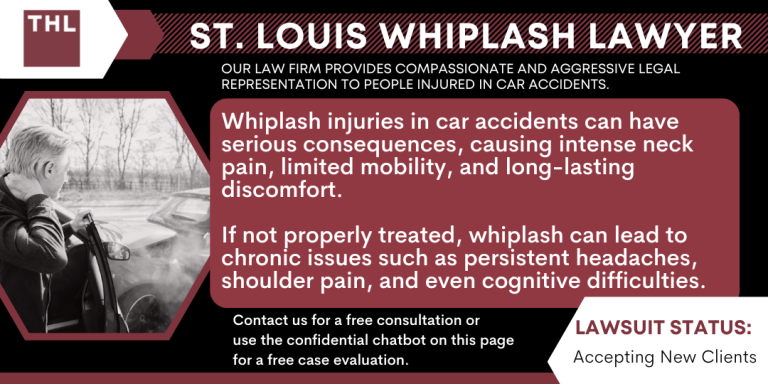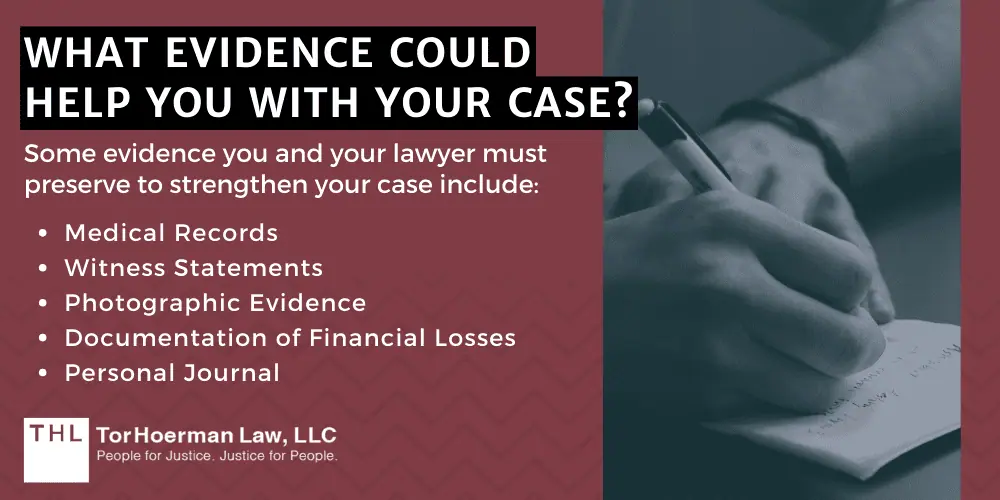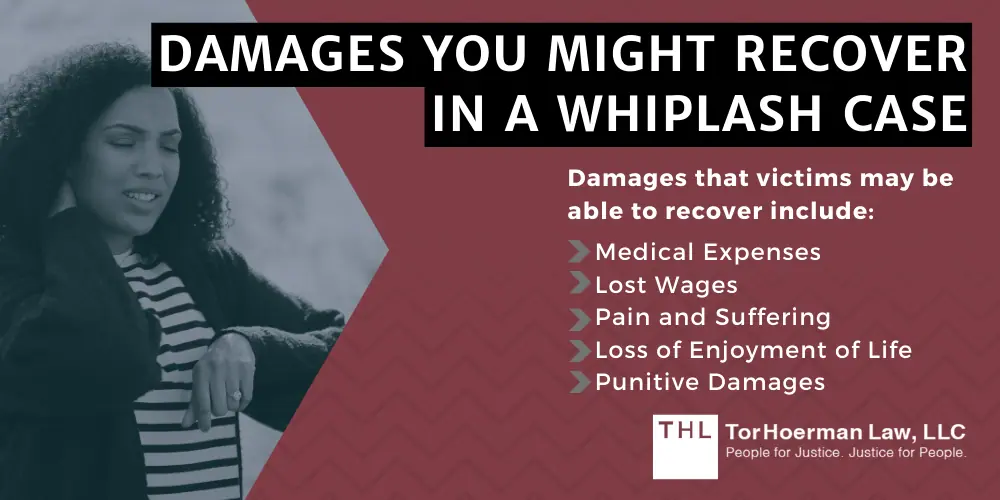Whiplash is a neck injury that occurs when the head is forcefully jerked backward and then forward, resembling the motion of a cracking whip.
Whiplash type injuries often happen during rear-end car accidents but can also result from various physical activities and accidents.
It’s crucial to seek medical attention promptly following an accident, even if symptoms of whiplash aren’t immediately apparent.
Some symptoms may take hours or days to manifest fully.
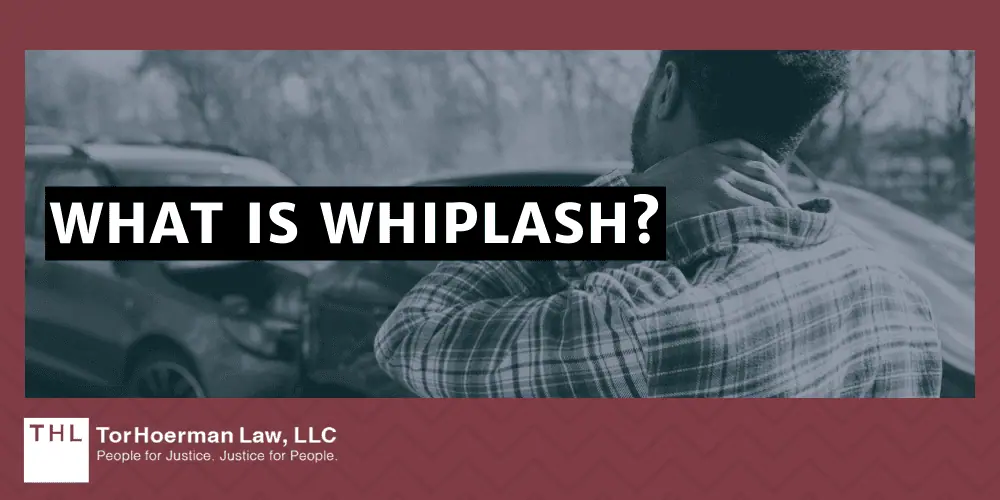
Early intervention can prevent the progression of symptoms and promote faster recovery.
Documenting these symptoms through medical records is also essential for proper treatment and legal purposes, especially if you’re considering filing an insurance claim or pursuing legal action against the responsible party.
How Do Whiplash Injuries Occur?
Whiplash typically occurs due to sudden acceleration or deceleration, causing the neck to hyperextend and then hyperflex.
Rapid movement strains the neck’s muscles, tendons, and ligaments, causing severe injuries and chronic pain in the neck.
Whiplash is often observed in rear-end automobile collisions.
Other types of car accidents can also cause whiplash injuries.
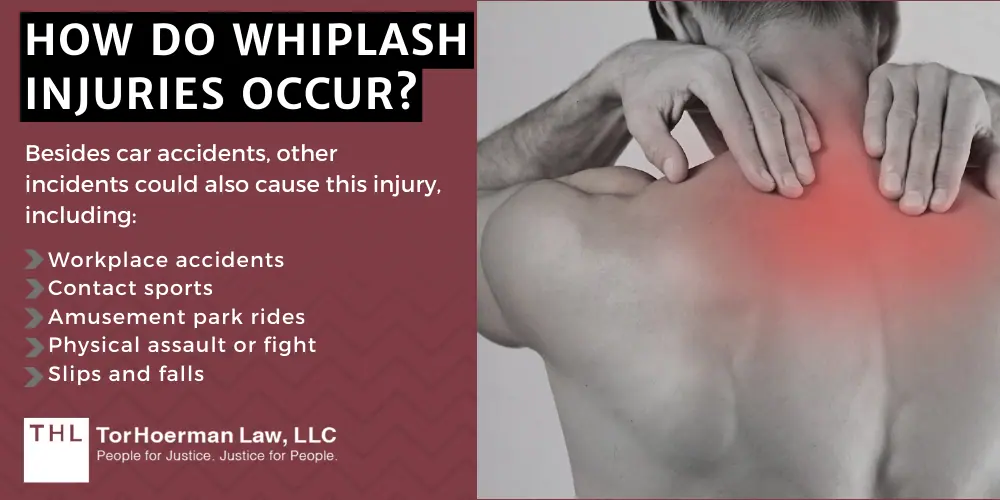
Besides car accidents, other incidents could also cause this injury, including:
- Workplace accidents (construction sites, warehouses, etc.)
- Contact sports (football, martial arts, basketball, etc.)
- Amusement park rides (roller coasters, steep slides, etc.)
- Physical assault or fight
- Slips and falls
Signs and Symptoms of Whiplash
It’s relatively easy to identify whiplash as it’s a common neck injury.
If you’re experiencing severe neck pain, then there’s a high chance that you have whiplash.
Some symptoms to help you evaluate if you have whiplash include:
- Neck Pain: This is the most common symptom, often characterized by a dull, aching sensation.
- Stiff Neck: Patients may experience difficulty moving their neck muscles, especially when turning or tilting.
- Headaches: Persistent headaches, often starting at the base of the skull and radiating towards the forehead, are common.
- Dizziness: Some individuals may feel lightheaded or dizzy, particularly when moving their heads.
- Blurred Vision: Vision disturbances, including blurred or impaired vision, can occur due to the strain on the neck muscles, affecting blood flow to the head.
- Muscle Spasms: Some individuals experience muscle spasms in their shoulders or arms when turning their heads.
How Is Whiplash Diagnosed?
Diagnosing whiplash involves a series of physical and imaging tests.
Imaging tests are the most definitive, but physical tests are conducted preliminarily to ensure that the patient is not experiencing any underlying injuries.
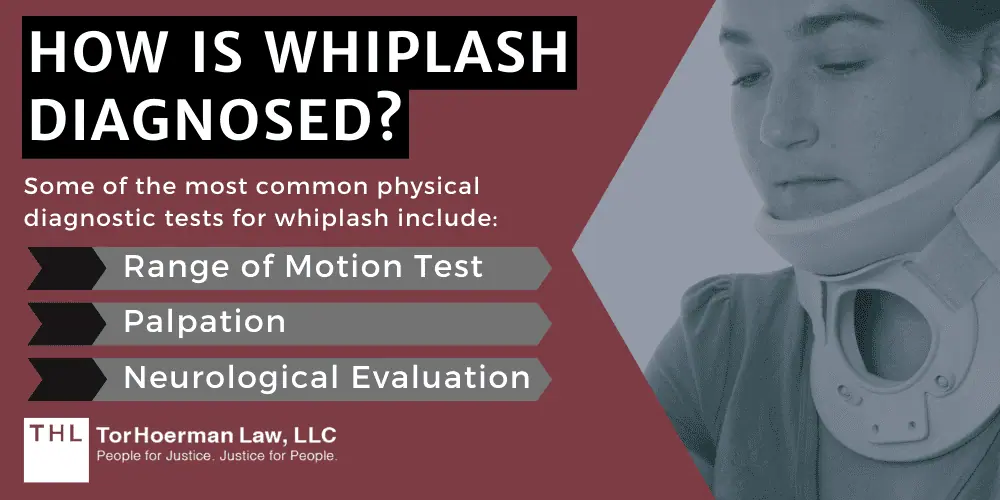
Some of the most common physical diagnostic tests for whiplash include:
- Range of Motion (ROM) Test: In this test, the doctor will evaluate your neck’s movement in different directions to determine any limitations or restrictions.
- Palpation: The doctor may also use their hands to feel for any abnormalities, such as swelling or muscle tightness.
- Neurological Evaluation: This test involves evaluating the function of your nerves, including any weakness or numbness.
X-rays and MRI scans are the most commonly used to diagnose whiplash injuries.
These scans can reveal any fractures, dislocations, or soft tissue damage that may be causing the symptoms.
How Is Whiplash Treated?
Many whiplash injuries are treatable with physical therapy or OTC medicine.
An individual may recover from whiplash within a few weeks or a month with proper treatment.
Depending on the severity of the injury, some individuals with a whiplash injury recover completely, while others may experience chronic pain.
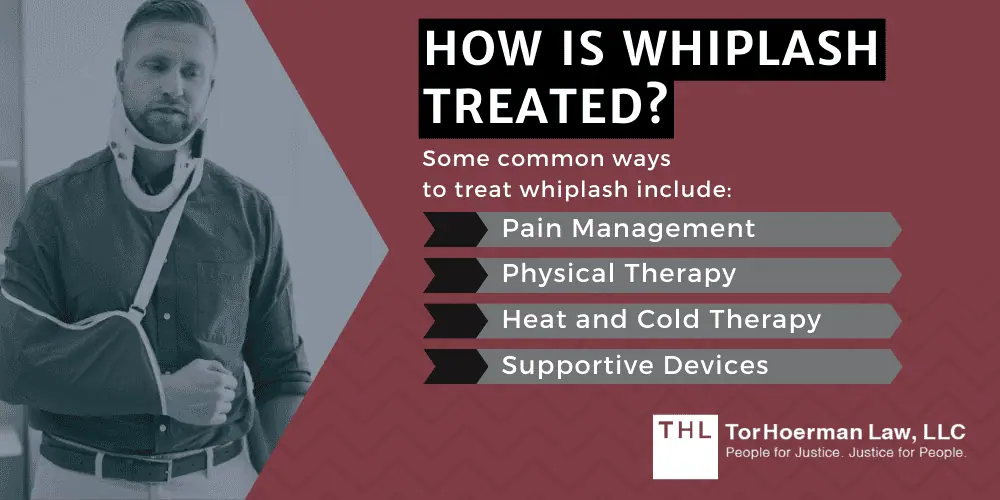
Some common ways to treat whiplash include:
- Pain Management: Over-the-counter pain relievers, muscle relaxants, and prescription pain medications can help alleviate discomfort.
- Physical Therapy: Exercises and stretches prescribed by a physical therapist can improve neck strength and flexibility.
- Heat and Cold Therapy: Applying heat or cold packs to the affected area can help reduce inflammation and alleviate pain.
- Supportive Devices: A neck brace or supportive collar may be recommended temporarily to support the neck and promote healing.
Long-Term Effects of Whiplash
While many people recover from whiplash within a few weeks with proper treatment, some may experience long-term effects, such as chronic neck pain or stiffness.
In severe cases, whiplash can lead to complications like vertigo or even cognitive difficulties.
Some individuals might have a limited range of motion in their necks, making it difficult to do daily activities.
They may also develop secondary musculoskeletal injuries if they have not received proper treatment.
Whiplash as a Secondary Injury
Whiplash is frequently identified as a secondary condition to more severe injuries sustained in car accidents, such as broken bones or spinal injuries.
This is because the sudden movement and impact that causes whiplash can also be sufficient to inflict more serious trauma on the body and soft tissue structures.
For instance, while the rapid jerking motion of the head strains the neck’s soft tissues, the same collision might simultaneously cause bone injuries, fractures, concussions, or other spinal injuries.
The complexity of diagnosing whiplash alongside these more pronounced injuries can sometimes lead to its symptoms being overshadowed or initially overlooked.
A physical exam following accidents are crucial to identify and appropriately provide specific treatment for both the primary injuries and secondary conditions like whiplash.


